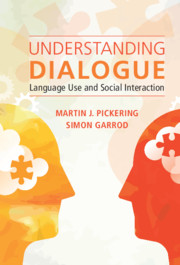
-
Select format
-
- Publisher:
- Cambridge University Press
- Publication date:
- 11 February 2021
- 07 January 2021
- ISBN:
- 9781108610728
- 9781108473613
- 9781108461931
- Dimensions:
- (228 x 152 mm)
- Weight & Pages:
- 0.58kg, 302 Pages
- Dimensions:
- (228 x 152 mm)
- Weight & Pages:
- 0.44kg, 302 Pages
You may already have access via personal or institutional login
Book description
Linguistic interaction between two people is the fundamental form of communication, yet almost all research in language use focuses on isolated speakers and listeners. In this innovative work, Garrod and Pickering extend the scope of psycholinguistics beyond individuals by introducing communication as a social activity. Drawing on psychological, linguistic, philosophical and sociological research, they expand their theory that alignment across individuals is the basis of communication, through the model of a 'shared workspace account'. In this workspace, interlocutors are actors who jointly manipulate and control the interaction and develop similar representations of both language and social context, in order to achieve communicative success. The book also explores dialogue within groups, technologies, as well as the role of culture more generally. Providing a new understanding of cognitive representation, this trailblazing work will be highly influential in the fields of linguistics, psychology and cognitive linguistics.
Reviews
‘What could be easier than having a conversation with another person? But behind this apparent ease hides a complex world of cognitive and social mechanisms. Presenting state-of-the-art research, Pickering and Garrod give the reader a guided tour of the science of dialogue, explaining convincingly why dialogue is humankind's most remarkable achievement. This book is a milestone in our understanding of dialogue that will influence the field for decades.'
Robert Hartsuiker - Professor of Psychology, Ghent University
‘This book is both timely and important. The consequences of the Covid-19 pandemic have changed conditions for communication in multiple ways, from interactions behind face masks to dialogues via Skype and Zoom.'
Peter Hagoort - Neurobiology of Language Department, Max Planck Institute for Psycholinguistics
Contents
Metrics
Altmetric attention score
Full text views
Full text views help Loading metrics...
Loading metrics...
* Views captured on Cambridge Core between #date#. This data will be updated every 24 hours.
Usage data cannot currently be displayed.
Accessibility standard: Unknown
Why this information is here
This section outlines the accessibility features of this content - including support for screen readers, full keyboard navigation and high-contrast display options. This may not be relevant for you.
Accessibility Information
Accessibility compliance for the PDF of this book is currently unknown and may be updated in the future.


